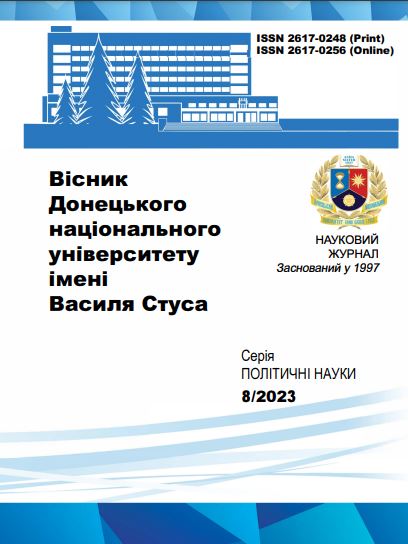Russian-Ukrainian war as a subject of world-system analysis
DOI:
https://doi.org/10.31558/2617-0248.2023.8.19Keywords:
world-system analysis; world war; Russian-Ukrainian war; world order; world-systemAbstract
The article raises the question that it is time to consider such a large-scale and tragic phenomenon as the Russian-Ukrainian war, not only in the context of media journalism, but also in the context of a deep theoretical analysis based on a well-developed methodology.
As a working model, authors propose the world-system analysis, developed by I. Wallerstein and a group of his like-minded colleges.
The authors of this article compare the conceptual content of world-system analysis with the most popular methodologies, such as: Marxism; the concept of S. Huntington`s "clash of civilizations", the theory of "civilizational waves" by E. Toffler, "historical finalism" by F. Fukuyama, "American-centric globalism" by Z. Brzezinski, the arguments of modern postmodernists.
Following the I. Wallerstein`s logic, the authors consider the Russian-Ukrainian war in the context of a chain of world wars, starting from the "Thirty-years" world war of the 17th century and ending with the "Cold war" (with collapse of the USSR). The authors come to the conclusion that each of these wars turned out to be a world-system "upgrade point" and a "change phase" of the global hegemon. On this basis, they raise the question of methodologically justified forecasting of the world-system future. They draw attention to Wallerstein's idea of world (so-called "thirty-years wars”) as "phases of the world system renewal", and "procedures for the hegemon change".
The authors emphasize that such a grandiose and terrible phenomenon as the Russian-Ukrainian war deserves a much deeper thoughtful approach than that which is observed by many of today's "hype masters". This war is a great tragedy, a great challenge and a great harbinger of the new unprecedented global change.
The authors call for the broad scientific discourse organization around this problem. At the same time, they formulate the object, subject, goals and objectives of such a discourse.
References
Nye Joseph. What caused Russia-Ukraine War. – https://www.project-syndicate.org/commentary/what-caused-russia-ukraine-war-by-joseph-s-nye-2022-10/
Bortnick Ruslan. Globalnyie prichinyi rossiysko-ukrainskoy voynyi // https://uiamp.org/
Wallerstein I. The inter-state structure of the modern world-system. International theory: positivism and beyond /Eds. by S. Smith, K. Booth, M. Zalewski Cambridge: Cambridge University Press, 1996. pp. 87–107.
Wallerstein I. The Modern World-System. Vol. III; The Second Great Expansion of the Capitalist World-Economy, 1730-1840s./ San Diego: Academic Press, 1989. – 390 p.
Wallerstein I. Unthinking Social Science. The Limits of Nineteenth-Century Paradigms. / Cambridge: Polity Press, 1991. – 296 p.
Wallerstein, I. The West, Capitalism, and the Modern World-System./ Review. 1992 Vol. XV, Is. 4. P. 561–619.
Wallerstein I. The Essential Wallerstein / New York: The New Press, 2000. 471 p.
Huntington Samuel P.. The Clash of Civilizations and the Remaking of World Order / Simon and Schuster, May 31, 2007 – 368 p.
Toffler, Alvin. The Third Wave: The Classic Study of Tomorrow Random House Publishing Group, 1981 – 537 p
Fukuyama, Francis. The End of History and the Last Man. / Penguin, 2012/ – 448 p.
Brzezinski Zbigniew The grand chessboard: American primacy and its geostrategic imperatives / New York: Basic books, 1998. – 240 p.
Brzezinski Zbigniew The Choice: Global Domination or Global Leadership/ Publisher. Basic Books Apr 29, 2009 – 239 p.
Brzezinski Zbigniew. Strategic Vision: America and the Crisis of Global Power. Grover Gardner. / Basic Books, 2012 – 224 p.
Tarnas R. The Passion of the Western Mind : Understanding the Ideas That Have Shaped Our World View. / Ballantine Books; Reprint edition (March 16, 1993. – 560 p.).

